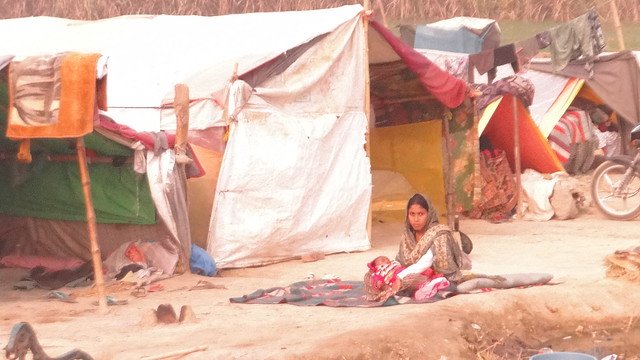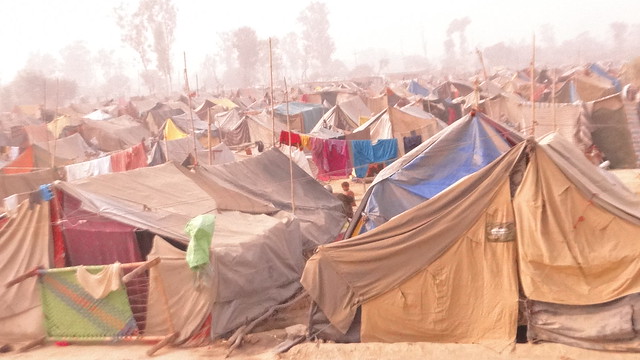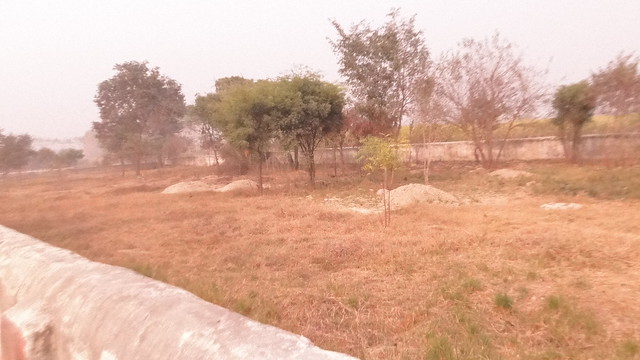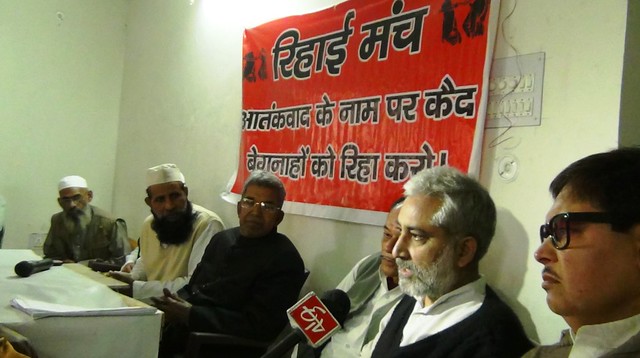By TCN News,
New Delhi: Hundreds of riot victims from Muzaffernagar traveled all the way to New Delhi demanding implementation of Supreme Court orders to give relief to the people living in harsh conditions in relief camps and enactment of a strong anti-communal violence law.
Several Members of Parliament, activists, lawyers, students and community leaders participated in the protest organized at Jantar Mantar near Parliament of India on Monday.
![]()
Mohammad Haneef from Loi village of Muzaffernagar covered himself in the blanket he was carrying to protect himself from the cold and fog that engulfed the national capital Monday morning. He shouted slogans against United Progressive Alliance (UPA) government at the Centre and Akhilesh Yadav led Samajwadi Party government in Uttar Pradesh.
“It seems we are alone in this world. There is no one to listen to us. We don’t have proper tents, food or drinking water. Our children are struggling to survive. So many people have died due to poor living conditions. We don’t know if we will ever be able to go back to our homes,” said Haneef who came to Delhi for the first time to participate in a protest. He was bewildered by large number of protests, posters and banners at Jantar Mantar organized by several organizations to mark the anniversary of Delhi gang rape incident.
“Is rape in Muzaffernagar different from rape in Delhi? There is no one to listen to rape victims in Muzaffernagar. Nobody has been arrested even when the women gave statement in the court,” said Haneef.
Haneef and other victims were brought to Delhi by Aligarh Muslim University Lawyers Forum, a registered body of lawyers who are alumni of Aligarh Muslim University (AMU).
Aslam Khan, president of the lawyers’ forum, said: “We are grateful to the Supreme Court for passing orders to give all kinds of protection to the people living in relief camps. But there is hardly any implementation by the district administration.”
“There is a total failure on the part of state government. More people have died in the relief camps than in the violence. But the govt is not acknowledging those deaths and forcing people to shut the relief camps. Where will these people go?” People in the relief camps are scared of going back to their villages due to hostile environment there.
The protesters also demanded that the UPA government should pass Protection of Communal and Targeted Violence Bill in the ongoing winter session of Parliament. It is due to lack of any specific law and accountability that such violence keep happening time and again.
Shahzad Alam Burni, president of AMU Students Union, said: “It is a long pending demand. The Congress party promised this Bill in its manifesto. But it never showed any interest in the enactment of the law. Congress party will have to pay a price for this.”
Naved Hamid, member of the National Integration Council, said: “We want a strong law in which the policemen are held accountable if there is any communal violence. Also, the law should be specific to the minorities otherwise it will become meaningless. A special law is meant to protect a specific group. The govt wants to dilute the law by making it for everybody. This is not acceptable.”
Members of Parliament like Shafiqur Rahman Barq of BSP, Ali Anwar of JD (U) and Mohammed Adeeb also addressed the gathering.
Resolution Passed at Jantar Mantar, New Delhi on December 16, 2013
Table the Prevention of Communal and Targeted Violence (Access to Justice & Reparations) Bill in the Upper House (Rajya Sabha) of the Indian Parliament.
This Bill when it becomes Law will be an institutional mechanism to protect the lives and properties of disadvantaged citizens who are victims of targeted and mass violence. It will fix responsibility on the officers of the state who show overt and covert complicity in violence against vulnerable sections of the society. It will give life into Articles 14 and 21 of the Indian Constitution (Right to Life and Right to Equality Before the Law)
The Bill - first drafted in 2005 – was redrafted in 2011 by the National Advisory Council along with members of the civil society. The Bill aims at removing certain anomalies in the existing structure, so that people can be held accountable.
In the last few decades we have seen gross injustice meted out to religious and linguistic minorities as well as dalits and adivasis in different states of this country through organized communal and targeted violence. By religious minorities we mean Kashmiri Pandits in J&K, Hindus in some of the north eastern states as much as Muslims, Sikhs, Christians and Parsis across the country. Tamilians in Karnataka and Biharis in Maharashtra are among the examples of linguistic minorities.
Along with the vicious and repeated targeting of religious and linguistic minorities, dalits and adivasis too continue to face repression in many parts of the country. In the last two years recurring communal riots in Uttar Pradesh is a matter of shame for all Indians.
The prevailing culture of impunity has led to growing alienation and erosion of faith in the system among the targeted communities. By its failure to protect the life and liberty of a section of citizens, the state sows the seeds of extremism.
Until now, governments have at best remained content with somehow restoring peace after protracted violence and transferring officers guilty of dereliction of duty. It is evident that we urgently need a new law to punish the perpetrators and masterminds of violence and to hold politicians, the bureaucracy and policemen responsible for law and order accountable for any dereliction of duty.
If the police and administration were to be held directly responsible for failure to enforce Rule of Law, perpetrators of recurring violence would be halted in their tracks. If the law could facilitate time-bound prosecution of those guilty, the political gains from engineered violence would diminish. If fair reparation commensurate to the loss were to be compulsorily paid within a short time-frame, the future would not benefit rioters.
In the 2004 Lok Sabha elections, the UPA coalition had included in its manifesto the promise to enact a new law to curb communal violence. But the nearly decade-old promise is yet to be fulfilled.
We therefore urge the UPA government to enable the tabling of the ‘Prevention of Communal and Targeted Violence (Access to Justice and Reparations) Bill, 2011’ in the Rajya Sabha without any further delay in the current winter session of Parliament.
Unfortunately, it has been reported in the media that the government under electoral pressure is trying to bring in a “weak” law. The Bill – which is actually meant for the minorities – has been amended to include all. While we uphold that justice be done to all but such an amendment will make the law meaningless. A special law is meant for the protection of targeted and vulnerable population. Making it neutral will be like taking the heart out of flesh and bones.
It has also been reported that the police officials and bureaucrats have been let free from any responsibility in the amended Bill. The entire exercise will become futile with this amendment. We, therefore, oppose this change tooth and nail.
Resolution on Muzaffarnagar
The guilty officers from the police and administration, responsible for dereliction of duty must be punished;
Anti-women campaigns like ‘Love Jehad’ or ‘ BahuBetiBachao’ movements should be viewed as crimes against women and dealt with in those terms;
Cases of molestation and sexual harassment should be prosecuted in a time bound manner;
The rights over land (land rights ) of the Victims and Survivors of the violence who have been displaced from their habitats should be preserved and protected as there is a real danger of over 1,000 acres of land being seized by politically powerful vested interests;
Immediate compensation to all the displaced;
Provide adequate food, shelter and warm clothes to those living in relief camps.
Courts should be approached for the cancellation of bail of those leaders responsible for hate speech and inciting violence who have been granted speedy bail.









